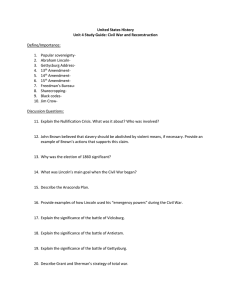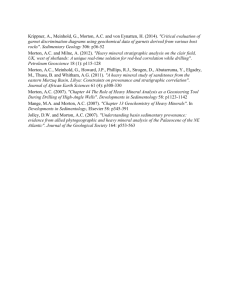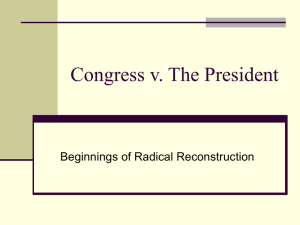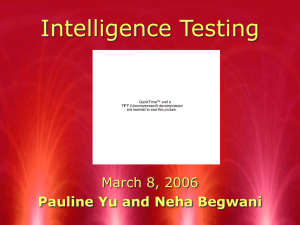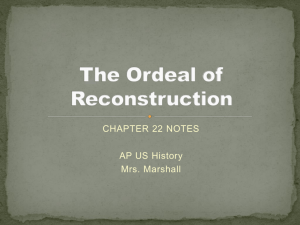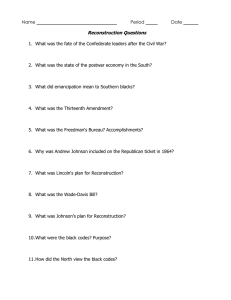The Changing Reconstruction Views of ... Oliver P. rvDrton Walter Biskupski
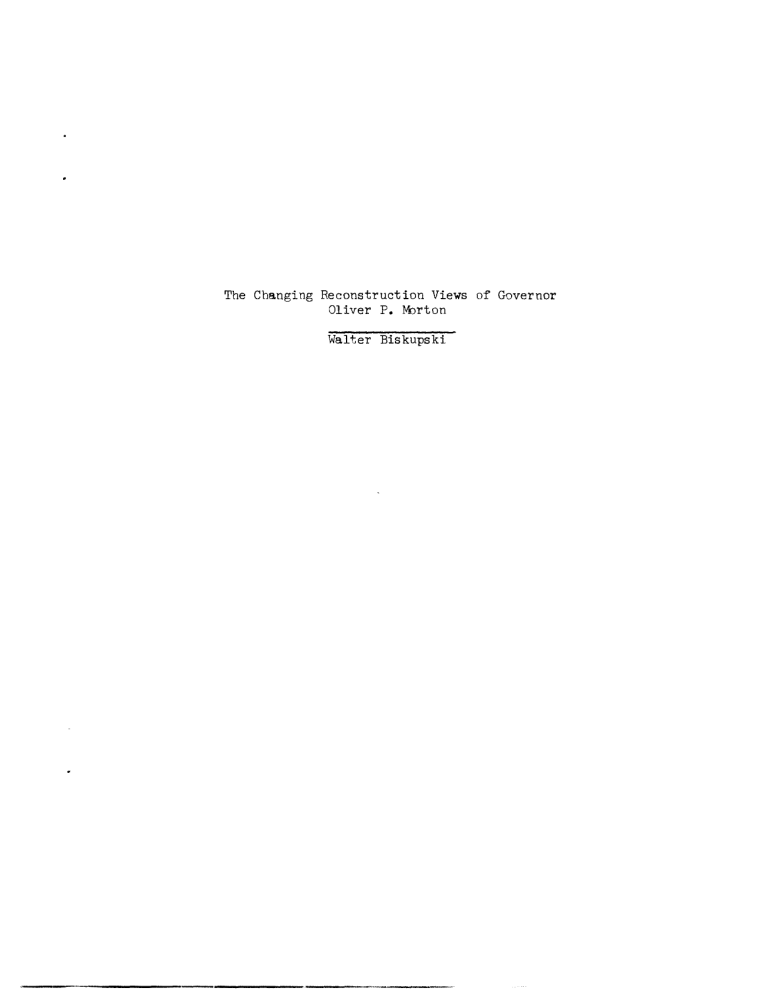
The Changing Reconstruction Views of Governor
Oliver P. rvDrton
Walter Biskupski
I re commend tbis
Ball State University tbesis for acceptance by tbe Honors Program of for graduation witb bonors • .
(' 1 l!', v \
Tbes is Adviser
Department of History r-By 28, 1970
I. Introduction
The purpose of this paper is the examination of primarily one man,
Governor Oliver P. Morton of Ind iana, and a narrative description of the change ot' attitude he had in the reconstruction controversy in the aftermath of the Civil War. The scope of the paper is generally restricted from the time of Lincoln's death to Morton's arrival in the Senate in early
1867. Rlt by that latter time, Morton was "rad icalized. " The factors working Dn him particularly, on his party, and on the rest of the citizeo.ry are examined in their importance on VlOrton
IS attitude.
The motives Which a person has in mind when taking a stand, the personal feelings and judgements which are not completely preserved in autobiographies, reminiscences, diaries, or letters, are finally his own. It would take a leap from fact to speculation to analyze and then attribut,= motives to people and actions over one hundred years ago. So much of 'what can be done is done with circumstantial evidence and, hopefully, an understanding of aoth historical perspective and human nature.
The pschDlogical/psychiatric study of Woodrow Wilson by Sigmund Freud and William Bullett l is an excellent example of the almost complete analyses in which the patient (or victtm) did not participate. The mixed reviewsJf the values of this work probably correlate with the adverse lSi~und,
Freud, William C. Bullett,
~
Houghton Mifflin, 1967.)
1
2. reaction of the public in being fed large doses of such analyses rather than the more comfortable small doses they have been used to.
Psy.:!hologically, intellectually, and politically, 1865-66 is a long way off. The understand ing of that period is clouded by every philolpher, invention and political event ocurring since that time. Yet works about the period have come at a rapid rate (though not as fast as those of the ever-popular Civil War). There is little that I have been uncomfortable with in writing this paper since basically I have used facts and narrative rather than a detailed analysis of ~rton. Any sense of original:'.ty present in this paper is the special meaning of party and especially the particular position of the Republican party after the
Civil War. The surpris ingly close conjunction between party and patriotism has not since been see n or experienced. ThiS, of course, will be elaborated upon in the body of the paper and in the conclusion, but it is speculation warranted by the evidence. The realization and acceptance of the problems involved in writing such a paper are, I feel, the primary steps in writing an "honest" survey and description of the change in
~,brton' s io eas •
3.
II. Morton, Johnson, and Jt::lian
When Governor Oliver P. Morton of Indiana led a delegation to visit
Presidert Andrew Johnson on April 21, 1865 (only seven days after Lincoln's assassination), the primary question on his mind, on the minds of everyone in the delegation and in the country, was what would happen to the defeated
Southern states; what attitude would the government take toward the people of those states, especially those who encouraged and excited the rebellion?
To the Indiana delegation, Johnson made his attituae eviaent: "Treason must be odious ••• traitors must be punished ana impoverished ••• the't('social power must be aestroyed.,,2 This statement was not uncharacteristic of
Johnson °3t that time. In another talk, referring to Lincoln's assass in, he said:
Is ·le alone guilty? The American people must be taught if ·~hey ao not alreaay feel - that treason is a crime and must be puntshed; that the government will not always bear with its enemies; that it is strong not only to pro~ect but to punish.
2
Such utterances buoyea up the hopes of those ,Tho wishea for a more militant policy toward the South. That such a result would not be under the leadership of Andrew Johnson was not known at the time. But what he dia say most certainly satisfied I-brton, Indiana's Civil War Governor.
Woen these two men faced each other in what was most likely mutual admiration (ana thus contrasting a similar scene about a year from then, but in different circumstances), a comparison between these two leaders was inevitable.
2Avery Craven, Reconstruction: The Ending of the Civil War (New York:
Holt, Rinehart and Wbston, 1969), 8~ - -
The
3 110yd Paul Stryker, Andrew Johnson: t-ncHillan Co., 1936); 206.
~
Study in Courage (New York:
4.
Andrew Johnson (1808-1875) was a Democrat for most of his life as a Representative (18 l i3-53), GDvernor of Tennessee (1853-57), and Senator
(1857-62'). His decision to stay in the Senate when his fellow Southern
Senators left during the winter of 1860-1861 gained him notoriety and respect :~n the North. After serving two years as military governor of
Tennessee, he was Abraham Lincoln's running mate on the Union ticket in
1864, anCi became President on April 15, 1865, after Lincoln's death.
Johnson vTas not a Republican and, as far as it is known, did not embrace the title. At most, he was a War Democrat, the type of running mate that
Lincoln felt was necessary to win the 1864 elections.
The background of Governor Oliver Hazard Perry Throck M:lrton (1823-
18(7) ~. just as interesting and varied as Johnson's. Except for a family incident, M:lrton might have even been born in Indiana. His father James
Throckmorton, felt that he had been cheated out of a proportionate share of an inberitance. Not only did he move from New England to Indiana, but probably in order to get at least some moral satisfaction out of the incident, he separated his last name, becoming James Throck Morton. 4 So when
Oliver wa.s born, the Throck became a middle name which he jud iciously deemphasised. MOrton's residence was established near Centerville, in the east central part of Indiana. He, like many politicans of the day, studied law and was admitted to the bar in 1847.
Politically, ~brton was a Democrat ana, in 1852, was elected as judge to the sixth jud icial district in Ind iana. In 1854, however, he s'YTitched to the young Republican ]?arty. In 1856, Morton was nominated by the
4Hilliam Dudley Foulke, Life of Oliver P. Morton, (Indianapolis:
Bowen-t~rr ill Company, 18 99), --r;-5-.-
-------------------
Republic9.ns for Governor, but was defeated by his Democratic opponent. 5
During this time, he and the Ind iana Republican party were changed with inviting support from the nativistic Know-Nothings. Tee abolitionist left wing of the Repllblican Party viewed ~lbrton .reJ:otly as the leader of t:"is movement.6 In 1860, t:"e Republicans nominated Henry S. Lane, a law::.rer, banker and stalwart Republican, for governor. II/lorton ran for lieutenant governor, but .... li th the understand ing that Lane, if poss ible, would be elected Senator in 1861. 7
In the Republican convention of 1860, the Indiana delegation, under lane and Morton, was instrumental in shifting support from William Henry
Seward of New York, the lead ing cand idate, to Abraham Lincoln. Seward, they claimed, couldn't carry Indiana because of the Know-Nothings in the whO state'were "slightly covered with a thin varnish of Republicanism.
1I
8
Seward's active intercession to guarantee the rights of immigrants and
Catholic:3 while Governor and then Senator from New York vTould not please these voters.
'\.Jit"1 Lincoln as the national Republican nominee, Lane and Morton won the 13tate election in October. Indiana was then an "October state,"
Le., the elections for state officials were held in October while national electionB vTere held in November. Thus Indiana's election was a "political barometer" of what would happen in the Presidential elections prescribed
5~)graphical
Directory of
~
D.C.; G.:='.O., 1961), 1365.
1774-1961~
(Washington
6Grace G. Clarke, Georer!i..
Commiss ion, 1923), 119.
Ju~a.n
(Indianapolis: Indiana Historical
7Poulke,
~rton,
1,66-67.
8Tbornton Kirkland Lathrup, William Henry Seward (Boston: Houghton
Mifflin Company, 1896), 217.
6. by the Constitution for rlovember. After a few days in January as Indiana'a governor, lane was chosen as Senator, and Morton succeeded as the state's chief executive.
As Indiana's Civil War Governor, Morton became nationally known.
He was active in raising troops for the Union effort. Politically, he battled a hostile state legislature for control of the state milita and for sufficient funds in order to run the state. He moved actively against
Southern sympathizers when they plotted to hamper Indiana's effort in the war. Finally, in 1864, he was elected governor in his own right. So when Morton visited Andrew Johnson in April, he was a nationally known and victorious leader of Indiana Republicanism.
In fact, if any difference was apparent between Johnson and Morton, it was the difference of party. Morton regarded the Democrats as disloyal.
In Indiana, they harassed him in the legislature and they organized secret and militant societies against the war such as the Knights of the Golden
Circle and the Sons of Liberty. In 1866, he attacked the Democratic
Party:
Every unregenerate rebel lately in arms against his government calls himself a Democrat. Every bounty jumper, every deserter, every sneak who ra~ away from the draft ••• Every man who labored for the rebellion in the field, who murdered Union prisoners by cruelty and starvation, who conspired to bring about civil war in the loyal states ••• Eveny dishonest contract~
••• every officer in the army who was dismissed for cowardice or disloyalty ••• every one who shoots down negroes in the streets, burns negro school houses and meeting houses ••• calls himself a Democrat.
Morton, after all this cataloguing, summarized his feelings toward the
Democrats:
In short, the Democratic party may be described as a common sewer and loathsome receptacle, into which is emptied every element of treason North and South, and every element of
inh'Jmanity and barbarism which has dishonored the age. 9
Governor MOrton was one of the first Republican political leaders to "wave the bloody shirt" in the 1866 Congressional elections. But consider ing the "behind the lines" criticism and harassment which the
Democrat:, used against him, there is little doubt that this ill-feeling toward t'1e copperheads and Democrats was as sincere as it was intense.
But the bond between these two men was stronger than Morton's hatred of the copperheads. This was the bond of Lincoln and the Union. Johnson, after all, did choose the Union when he remained at his Senate desk while the other Southern senators returned home. The calumny he suffered at home certainly helped him in the North. MOrton was also for the Union, even if ~V'ar had to be waged in order to preserve it. On January 22, 1861, he declared that all loyal people should issue a "solemn rebuke of that treason 1V'hich is aiming a fatal blow at the liberties of the world ••••
There should be but one party," Morton added, "and that the party of the constitution and the Union. ,,10
The other factor of unity, along with preservation of the Union, was the attitude toward Abraham Lincoln. He was connected with the idea of
Union as no one else in the era. Though his apotheosis did not really take effect until after his death, Lincoln was still a symbol of
Republicanism and Union. To Morton, these two terms were synonymous.
After Lincoln's assassination, the memory of him was still strong enough to give his successor in the White House a good deal of good will from the moderate Republicans.
9Foulke, Morton, I, 474-475.
-~., 103.
8.
Standing along with Governor Morton on that April day was a
Republican who was not so moderate, Representative George Washington
Julian (:_817 -1899). Julian was born near Centerville, Ind iana, and was admitted as a practicing attorney in 1840. He was elected to the House of Representatives as a Free Soil Party candidate (1849-51). In 1852, he was the Free Soil Vice Presidential candidate. He then joined the
Republican Party and was elected to the House of Representatives for five terns(1861-71).11
Toe political relations between MOrton and Julian were strained.
They were political rivals from the same state, from even the same section of the state. While Morton was cautious, and surveyed his political footing before leaping into political controversies, Julian was not that hesitant.. When Senator Stephan Douglas of Illinois introduced the Kansas-
Nebraska Bill before the Senate, Julian passed around to the Ind iana party leaders a statement condemning the proposal. All but t~rton signed
"t
1 "
12
This bill fanned a controversy that was JUlian's overrid ing cause the slavery question. The Ind ianapolis Daily Journal, the main Republican paper in Indiana (and partially owned until 1866 by Governor r,brton's close friend, William R. Bolloway) attacked Julian in late 1865, stating that "haying given his whole life to the slavery question, he knows comparatively nothing else. ,,13
During the early part of the Civil War, both houses of Congress passed a resolution setting up a Committee on the Conduct of the War llBiographical Directory, 1142.
12Clarke, Julian, 150.
13Indianapolis Daily Journal, November 18, 1865, 1.
9. with Julian as one of the four Representatives, and Andrew Johnson as one of ttree Senators on the co~~ittee. It was around this time that
Julian hearing Johnson's views on the Negro concluded that "he (Johnson) was at heart, as a decided a hater of the negro and of everything savoring of abolitionism, as the rebels from whom he had separated. 1114 But in
April, after Lincoln's death, what Julian wrote shows his attitude toward both Lincoln and Johnson:
I spent most of the afternoon in a political caucus, held for the purpose of considering the necessity for a new
Cabinet and a line of policy less conciliatory than that of r~. Lincoln; and while everybody was shocked at his murcer, the feeling was nearly universal that the accession of ~rohnson to the Presidency would prove godsent to the country. As ide from Mr. Lincoln's known policy of tenderness to i;he Rebels ••• his ••• views of the subject of reconstruction were as distasteful as possible to radical Republicans .15
So though leary of Johnson's attitude toward the Negroes, Julian seemed assuaged by his strong stand against letting off the defeated rebels too eas iJ_y •
App=_ying the two criteria listed above as factors of unity between b+:tv.iQ.~,""
Morton and Johnson, this difference
I
MOrton and Julian can be highlighted.
Along with preservation was to come abolition of slavery: these were the
Castor and Pollux of the war and would have to be obtained jointly. Also,
JUliads attitude toward Lincoln differed from M:>rtonts. Being on a commi ttee which could be and often was critical of Lincoln ts handling
14George W. Julian, Political Recollections, (Chicago: Jansen,
McClurg and Company, 1884), 243.
15 James G. Randall and David Donald, The Civil
(Boston: D.C. Heath and Company, 1961),
~
Julian disputes this assumption of his satisfaction with Johnson in his later-written Recollections, p. 262, when he 1ITites of the April 21 meeting: "I was disgusted, and sorry that the confidence of so many of my rad ical friends had been entirely misplaced."
10. of the '\-Tar effort, Julian did not so totally trust Lincoln's judgment.
As the above quote (footnote 15) illustrates, by the time of Lincoln's death, Julian was pretty well estranged from Lincoln primarily because of the President's reconstruction policy.
By the comparisons of these three men, the lines of interrelationships and differences are important in noting MOrton's shift from a moderate to a radical position in the reconstruction controversy. In attitudes and beliefs and especially in their attitude toward Lincoln,
Morton was closer to Johnson than he was to Julian. When MOrton made a speech in his delegation's meeting with Johnson, the President stated that he timself could have made the very same speech.
16
But in the question of party, it was .Julian and llbrton joined as Republicans. This is not to say that Julian was representative of the Congressional
Republicans. In fact, even after the success of the rad ical program, he still left the party in the early 1870's after being rejected for re-nomine,tion by the Republicans in his d i.strict'! But in 1865, both men were members of a party that was organized only thirteen years previously and which had victoriously survived the Civil War against Confederate and some Democratic opposition. This young party had to be protected and propagated by its members against any challengers or dangers, present and future. At least to the Republican party faithfuls, party partisanship was patriotism, 9.nd patriotism was part~! partisanshi-p. :lovlever, in April of 1965, with a supposedly "hard-line" President b. the White House, l6Foulke, Morton, I, 441-442.
11. there was DO obvious dangers to the safety of the party. The Republican
Farty, or at least most of it, stood behind the former Democrat. It was up to AndrevT ,Johnson to change t"lis situation.
12.
III. To Form a More Perfect Union
When Andrew Johnson announced his plan of reconstruction on M3.y
29, 1865, while Congress was not in session, the radica]j~ former confidence in Johnson was destroyed. Johnson's provisions were similar to the moderate terms which Lincoln had proposed and the radicals haa rejecteCi. In addition to Johnson's plan was a section excluding from the amnesty SouthernlJ"& with property valed at $20,000 or more, for the Preflident believe~
"it was the wealthy men of the South who dragooned the people into secession.,,17 These people, the Radicals discovered, were the ones whom Johnson considered the traitors. But even they could obtain l~rdons easily if they applied for them.
The Presidential-constructed reconstruction continued with the appointment of provisional goverT'.ors for the states still under reconstruction and the calling of state constitutional conventions. Johnson, evidently worried about the Republican reaction to his plan, suggested in a letter to his provisional governor in MiSSissippi, William L. Sharkey, that Negroes who could read the Constitution in English and could write their names, Dr who owned real estate valued at $250 or more and paid taxes on it, be allowed to vote. In this way the Radicals could be
"completely foiled on their attempts to keep the Southern states from renewing their relations to the Union by not accepting their Senators and Repr8sentatives. ,,18 But instead of this moderate stance, the conventiDns enacted a series of black codes, though not slavery, then a
17 I<i:mneth M. Stampp, The
~
Books, 1965), 63.
18
Andrew Johnson, The Andrew Johnson Papers, Series 3A. (Washington
D.C.: Library of Congress, n.d.), 229-230.
13. legal t:lpe of serfdom. This obvious re-establishment of t':1e status quo before the war certainly worrieo the Republicans who oidn't want similar conditions which began the Civil War in the first place to take root again in the South.
Johnson's worries about the North's reaction to his program were eased after Governor Oliver P. ~~rton strode out on a platform in Richmond,
Ind iana, to discuss ':1is theory of reconstruction on September 29, 1865. r·lorton opened his sp8ech with the assertion that the idea of secession in the Southern states was dead. Indeed, he claimeo, "there is no more danger of secession in South Carolina or Georgia than there is in the state of Ind iana. "19 Then Morton examined the reconstruction policy that
Johnson instituted and came to the conclusion that it was basically similar to Lincoln's policy which lvbrton hao supported. 20
Coming then to what easily was becoming the main issue, what to do with the emancipateo slaves, he proposeo a wide-range plan:
I f I had the power, I would arrange it in this way: I would give these people, just emerged from slavery, a period of probation and preparation. I would give them tim:; to aquire a little property, and get a little education, tim:; to learn something about the simpl~st form of business, and prepare themselves for the exercise of political power.
At the end of ten, fifteen, or twenty years, let them come into the enjoyment of their political rights. By that time, the;3e Southern states will have been so completely filled up "oy emigration from the North and from ~~rope that the
Neg-roes will be in a permanent miniority.
Thus Ynrton advocated a grad ual assemulation of the Negro population into
1901iver P. Morton, "Speeches ". (A collection of newspaper clippings compiled by the Indiana State Historical Library), 2.
20 'd
3.
2111 'd
19.
14. the righ'js and liberties of cittzenship, while at the same time, the
Southern conventions were just as active in trying to circumvent any such rights.
During most of 1865, Morton had been ill, but still continued his official functions. But on October 10, "as I attempted to get out of bed, I discovered I was unable to lift my limbs •••• I felt no pain, but from my 'lips downward I was unable to move. ,,22 Thus began a paralyslts which cOltinued to plague him throughout the rest of his life.
Geo:rge W. Julian, on November 17, 1865, in Ind ianapolis, replied to l~rtonts Richmond speech. Julian stated his ~ punis~ment of the Confederate leaders. For Jefferson DaviS, he would "build a gallows and hang him, in the name of God • ••• 1 would dispose of a score or two of the rn')st conspicious of the rebel leaders. ,,23 Then Julian would seize the larg':: Southern estates "and parcel them out among our sold iers and seamen, and the poor people of the South, black and white, as a basis of real deffi')cracy and genuine civilization. ,,24 Finally, Julian addressed himself to Morton's gradualistic approach in allowing the Negro voting rights: "If you want to prepare the negro for sutirage, take aft: his chains ald give him equal advantages with white men in fighting the battle of life. ,,25 To give the Negroes the vote would be to have a loyal element in the S,)uth; suffrage was based "on the more immediately imperative
22
Foulke, Morton, I, 454. and
23Gl::orge
Houg'lton,
W. Julian, Speeches on Political Questions, (New York:
1872), 267, 268.
Hurd
24 r 268.
25 Ibid • ,
276-277.
15. ground oj' national salvation. ,,26 So the gap between Morton and Julian was still wide in both method and philosophy. But even while these speeches were being made, events proceded in the South.
After the state constitutional conventions, elections" for state and national offices were held. The voting certainly did not ease the fears of the Republicans who were suspicious of Southern upsurgance. I f the great body of Southern people desired peace, they desired to have it under their former leaders. In elections throughout the reconstructed South, the voters turned to the very people who revolted against the Union, either as miltary leaders or as administrators. Among officials elected were Confederate Vice President Alexander Stephens, fo\fcConfederate generals
~I five colonels, six cabinet officers, and fifty-eight Congressmen. 27
I f
S.
!;th ever ~L case for ar unrepentant I could be made, this .a.ction of the
Southern voters would be primary evidence. Even Andrew Johnson was becoming uneasy about the election results. He wired William H. Holden,
Provisional Governor of North Carolina, that the election of so many
Confederates would damage the acceptance of his program.
28
But whatever his fearn, he gave out pardons to those elected who had not yet been pardoned ..
Despite the growing uneasiness of the Republicans about the presence of former Confederate leaders as elected representatives of the South and about the state constitutions and their black codes, Governor Morton still strongly supported the President. On December 7, in New York while
26 Ulid ., 282.
Sons,
27 James P. Shenton) (ed.), The Reconstruction (New York: G.p. Putnam's
19 6 3), 3.
28
John Hope Franklin, Reconstruction After the Civil War (Chicago:
Univers ity of Chicago Press, 1961), 44.
16. waiting to sail to Europe, ~lorton wrote Johnson that "the great body of the peop:Le of the North will endorse your d oetrine and policy, and this the members of Congress will find out before they are ninety days older.
I can't be mistaken. 1129
In mid-December, with trouble brewing with the convening of Congress,
¥lOrton left fort France for treatment of his paralys is. At this time, he wrote, he was "so weak and feeble that I can hardly stand on my feet. "30
He traveled first to England, then to France where the treatment for his partial paralysis was for the most part unsuccessful. He then canceled the rest of his vacation to return to the United States.
In Hashington D.C., the controversy on reconstruction raged. As
Johnson :~eared, when the Southern congressmen tried to present their credentials, they were not admitted. Congress then appointed a Joint
Committee of Fifteen (six Senators and nine Representatives) to investigate the actions of the Southern states. This committee, Horton advised Johnson in the December 7 letter, "is cunningly devised and is intended to trap your friends in such a manner they cannot escape.,,3 1 The conflict became acerbic 1.rhen the Pres ident vetoed an extens ion of the Freedman's Bureau on February 10, 1866.
Commenting on Johnson's difficulties, the Indianapolis Daily Journal in Janua:~y stated what was ti:len probably close to~rton' of Johnson's actions:
29ultely Thomas, The First President Johnson (New York: William
Morrow and Company, 19bB'T, 3%.
3
0
Ind ianapolis Daily JO'.lrnal, January 15, 1866, p. 2.
31Howard K. Bea:e, The Critical Year (New York: Hascount, Brace and
Company, 1930), 75.
17.
He pledge him our heart~T con:'idence and support i'-l all his efforts to restore harmony and mutual tnwt between the d if:'erent sections of the Union upon the princi1)les of universal liberty and justice to all.3 2
Even a:'ter his veto of the Freedmar,'s Bureau Bill, the Journal still stated Ls s'Xpport for JnhnsoD, while castigating "the silly exultation of the faction, whicb sees in the vote the establishment of an irrepairable breach between the Pres ident and the Union Party. 1133
\'Tith Congress and the President in a seeming deadlock over reconstruction, Hor~~on returned to Few Yorl<:: City on I'nrch 7. While 1'.e was still there,
Lyman Trumb-.ll, a moderate Hepublican Senator from Illinois, introduced the Civil Rights Bil1. Tbe bill bestowed citizenship on the Negro and granted eivil rights to all persons born in this country except Ind ians. 34
I.'brton, nO,T watching tLe moderate Republicans turning away from Johnson, left for Washington for an interview with the President. r~rton asked him not to veto the recently passed Civil Eights Bill (April 9), that it would cause a split between t~1e Republican majority and Johnson. "All roads ou'~ of tl1e Republican Party," emphas ised Morton, "led into the
Democrat:ic Party. "35 Johnson did veto the Civil Eights Act, which theD passed over his veto. Then the Freedman's Bureau bill was also passed over his veto. On April 21, Thaddeus Stevens proposed what was to be the
Fourteetr~h Arnendr.1ent. The bas ie outline of the amendment was presented to
Stevens and ~1Jrton by Robert Dale Owen, the son of Robert ehren, the founder
32 Ind ianapolis Daily Journal, January 4, 1866, p. 1-
33l!dd., February 28,1866, p. 3.
3
4
Randall and Donald, Civil War, 579.
35lawanda and John H. Cox, Politics, Principles and Prejudice 1865-1866
(London: Free Press of Glencoe, 1963), 227.
13. of the
V~opian
community of New Harmony in Indiana. 36
When Morton returned to Ind iana after his interview with Johnson,
~1is ideas about reconstruction were evidently changing. In the middle of the national Congressional elections of 1866, and certainly with the aspiration of a Senate seat for himself, Morton spoke in the M3.sonic Hall in Ind ia:1apolis on June 20. He declared that there should be "two lead ing principles ••• kept in view" in reconstruction First, "nothing should be done to injure or disarray the general theory or scheme of government." Second, safeguards should be applied so that the Southern states could be stopped in trying to accomplish "in the government what they had foiled by force of arms. 1137
In early fall, President Johnson made a campaign trip to Indianapolis, and Morton, some months ago one of his most eloquent supporters, was not in the city to meet him. Tragically when Johnson was there, a riot broke ou'~ and one person was killed)8
But going into September, Governor Morton was still not decided about
Negro suc'frage. In a gathering of governors during a 'Northern and
Southern Loyalist convention, II"JOrton declared himself opposed to Negro voting and used his personal influence with the delegates to keep the question of suffrage out of the platform. 39
But with the Radicals victorious in the 1866 elections, Morton came
36Rembert W. Patrick, The Reconstruction of the Nation (London:
Oxford University Press, 19m, 76. - - -
37Indianapolis Daily Journal, June 20, 1866, p. 1-
3
8
C=.aude G. Bowers,
Company, 1957), 137.
39Beale, Critical Year, 184-185.
19. completely to their side but for the stated purpose of preserving the
Republican party. Giving the ballot to the uned ucated Negroes, he declared on January 11, 1867, was repugnant •••• But the necessity for loyal Republican sta'~ governments that shall protect men of all races, classes and opinions, and shall render allegiance and support to the government of the United States, must overliide eveTY other consideration of prejudice or policy. 0
The postscript of Morton's career in the Senate shows that at least he was faithful to the people for whom he changed his mind. He avidly supported Congressional recolllstruction, voted for Johnson's impeachment, voted fOT and vocally supported the Klu Klux Klan laws, and became a stalwart leader of the RepUblicans in Ind iana and in the Senate. Throughout his .3enate career, he defended the Negroes and Reconstruction until his deat1 in 1877. Even in 1876, when it was unfashionable to do so,
MJrton p')rtested the Southern white terroristic tactics in the remaining unreconstructed states during the election of 1876.
The change in rvbrton's attitude toward the Negro can be shown through his acti')ns. In 1851, he voted for a proviSion in the Indiana Constitution which exr::luded Negroes from the state and punished those people who encouraged the Negroes to stay.41 But by 1865, in a reply to a letter seeking advice, Conrad Baker, Indiana's Lieutenant-Governor, gave these views concerning the exclusionary law "believing that they do not differ from Governor Morton's." The lady writer, having been harassed because she brought 'in a Negro servant, was told that the law was "a dead letter" in most of Indiana. Baker further advised the lady to either test the law
4~[)ulke,
Morton, I, 486.
41clarke, Julian, 119.
20. or to mo're to some other -part of the state "where there will be no changes of mob vlolence.,,42 Morton also sponsored the repeal of a state law which excluded Negro testimony in court cases. 43 These instances exemplify the sympathe·~ic attitude which Morton' did have toward the Negro not only in the Southern states but also in his own state of Ind iana.
4201iver P. Morton, "The I.etterbooks of Oliver P. Morton," (bound collection of letters by the Indiana Sta.te Historical Library), 309.
43 cox , Principle and Prejudice, 227.
----------
._-_._---_.
21.
IV. Conclusion
Oliver P. Morton was a man of party, as he was a man of patriotism.
His patriJt ism was obvious in his active support of the Union during the
Civil War. Even his Hepublicanism was patriotic, especially since the
De'11ocrats in his statIO as well as throughout the country, were hindering the course of the war.
Toward the end of the war, there supposedly was no Republican party; i t was renamed as the Union party to include the l.Jar Democrats. But despite the renaming, the idea of the Republican party was still there.
The Republicans emerged as the victors in the war. Four years of bloodshed·-and fraternA.l bloodshed at that - had accomplished the preservation of tmion and the abolition of slavery. Certainly, these gains haa to be kept. But any threat to them had to be precipitated by the Southern states.
In what must certainly have looked like a diabolical combination,
Pres ident Johnson and his reconstructed states tried to bring back into the
United States the very men who had engineered tho vTitharawal of these
Southern states from the Union.
The idea of r;egro suffrage a ia not appeaJ to VJOrton because of the ver::' cona itians which the Negroes were exposed to in the South, especially illiteracy. :Sut finally, \':e concluded, there simply was no other feasible and immediate alternati','e. It was either give the ballot to the Negores now or lose the Sontl, to the Democratic :?arty.
Behind the decisioLs of tho Republican leaders was the idea of party.
The party t~1at had won the war was now had to win the peace. In this context, Lincoln had made A. serious mistake in chOOSing Andrew Johnson as
22. his running mate in 1865. For Johnson was anything but a "party man."
He couldn't care which party had the balance on power in the South, though perhaps his Democratic leanings were sbow1.ng when he practically granted amnesties en masse to petitioners.
The Republicans probahly conlo not have kept the balance of power in theiy hands by any bet co-ercive means in the South. Such co-erci\te means were not usee in the summer and fall of 1865 ana what resulted was almost complete overturntng of the results of the Civil "Jar. Since these Southerns who trieei to reenter the United States were Democrats, the Republicans haa yet another reason to consider themselves as the party of patriotism.
Unl:.ke the loyal oppositions that have been prevalent during the internat:~onal wars ie the twenteth century, the Democracts in the early and mid-··1860's were an unloyal opposition much of the time.
So reconstruction was a sort of retrenchment after the war. It was conservative in the sense that it sought to protect those advantages and changes gained as a result of the Civil War. M:lrton first thought that
Andrew Johnson would protect these "fruits of victory," but the policy which Johnson adopted threatened to nullify any SUbstantial advantage that the North had gained from the war. The
"1' ad icals' tried to conserve these gains by building a Dam of acts, resolutions, and amendments to hold back the tide of white Southern Democracy.
Rutherford B. Hayes once wrote that t-1orton was "the great statesmen ,,44 in the Republican party. Such a statement, made by one Republican about another Hepublican, can be taken as simply party flattery. Certainly, some
44Harry Barnard, Rutherford B. Hayes and
Bobbs-M2n:rill Company, 1954), 240:-
23. would maintain that reconstruction as practiced by the Congressional
Republicans was anything but statesmanlike.
But if the definition of "statesman" is accepted to mean one who tries to preserve and improve existing institutions and ideas, then in the field of reconstruction, Oliver P. Morton was consistantly a
"statesman."
Bibliography
Barnard ,3arry. Rutherford B. Hayes ~ Indianapolis:
Bobb:3
-r~rr ill Company, 1954.
Beale, Ho·,ro.rd K. The Cr it ical Year. New York: Ha,,-court, Brace and
Company, 1930.
Biograpl1i~
Director? of American Congress 1774-1961. Washington D.C.:
G.P.O., 1961.
Bowers, Claude G. The Tragic Era. Cambridge: Houghton gifflin' Company,
1957.
Clarke, Grace G. George W. Julian. Indianapolis: Indiana Historicl
Comrrission, 1923.
Cox, lawanda and John H. Politics, Principle ~
London: Free Press of Glencoe, 1963.
Craven, Avery. Reconstruction: The End ing of the Civil~. New York:
Holt, Rinehart and Winston, 1969.
Foulke, vTilliam Dudley. Life of Oliver P. }/lnrton.2 vols. Indianapolis:
Bmven Verrill Company, 1899.
Franklin., John Hope. Reconstruction After the Civil 1fJar. Chicago:
Uni ;rers i ty of Chicago Press, 1961.
Indianapolis Daily Journal. 1865'-1866.
Johnson, Andrew. The Andrew Johnson Fapers. Series 3A. Washington D.C.:
Lib:~ary of Congress.
Julian, George WaShington. Personal Recollections. Chicago: Jansen,
McClurg and Company, 1884.
Julian, }eorge Washington. Speeches ~ New York:
Hurd and Houghton, 1872. lathrup, Thorton Kirkland. William Henry Seward. Boston: Houghton
}/l~fflin Company, 1896.
MJrton, Oliver P. "The Letterbooks of Oliver P~ M::>rton." A bound collection of letters by the Indiana State Historical Library.
Morton, Oliver P. "Speeches." A collection of newspaper clippings compiled by the Indiana State Historical Library.
Patrick, Rembert W. The Reconstruction of the Nation. Doneon: Oxford
University Press, 1967.
Randall, James G. and ~onald, David. The Civil War and Reconstruction.
2nd ed. Boston: D.C. Heath and Company, 1961.---
She'lton, James P. (ed.) The Reconstruction. New York: G.p. Putnan's
Sons, 1963.
Stampp, Kenneth M.
1965.
The Era of Heconstruction. New York: Vintage Books,
Stryker, Lloyd Paul. Andrew Johnson:
IvRcMHlan Company, 1936.
!
Study!!!. Courage. New York: The
Thomas, lately. The First President Johnson. New York: William fvbrrow and Company, 1958.
